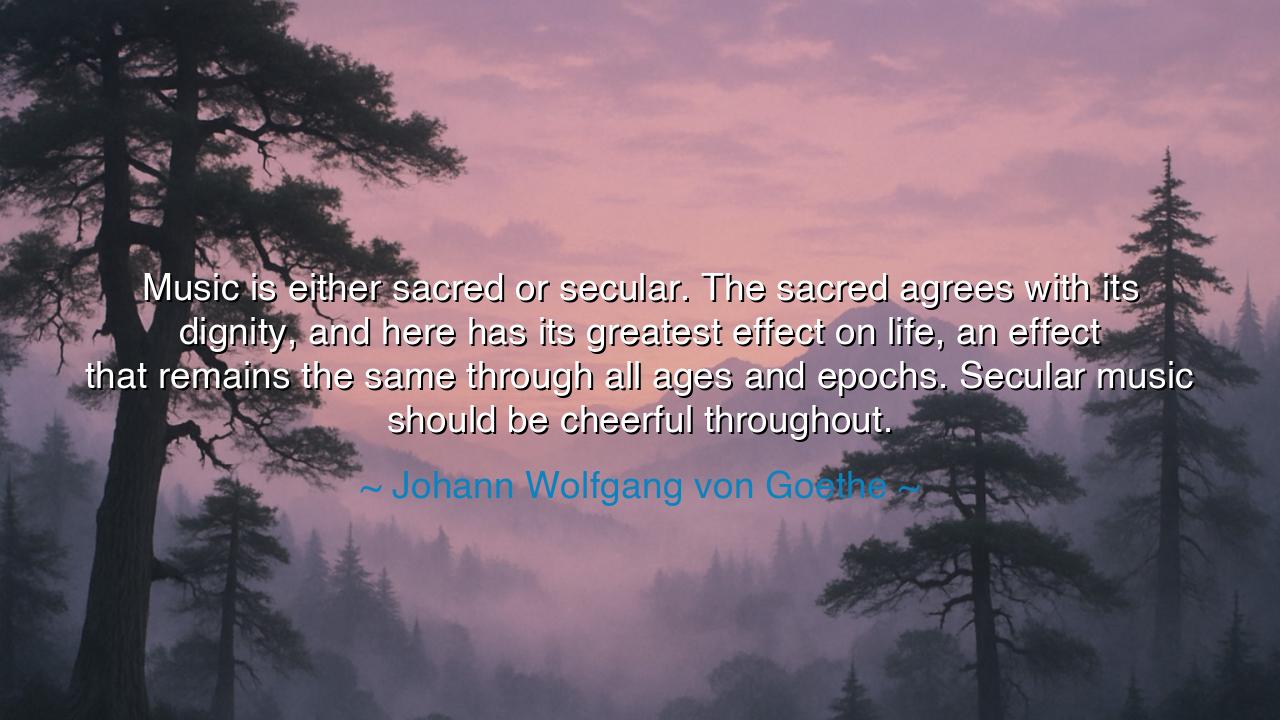
Music is either sacred or secular. The sacred agrees with its
Music is either sacred or secular. The sacred agrees with its dignity, and here has its greatest effect on life, an effect that remains the same through all ages and epochs. Secular music should be cheerful throughout.






Hear the solemn words of Johann Wolfgang von Goethe, poet of nations and prophet of truth, who declared: “Music is either sacred or secular. The sacred agrees with its dignity, and here has its greatest effect on life, an effect that remains the same through all ages and epochs. Secular music should be cheerful throughout.” In these words lies not merely a reflection on art, but a philosophy of life itself. For Goethe, music was not idle sound—it was a force that shaped hearts, guided spirits, and marked the rhythm of existence.
The ancients too knew this division. Among the Greeks, hymns were sung to honor Apollo or Dionysus, sacred offerings meant to bridge the mortal and the divine. Yet alongside them rang the songs of banquets, lighthearted melodies for joy and laughter. The Romans also made such distinctions: the solemn chants of the Vestal Virgins differed from the merry songs of festivals. Goethe, inheriting this wisdom, reminds us that sacred music, bound to dignity, does not lose its power with time. Its effect is eternal, for it speaks not to fashion, but to the soul’s yearning for the eternal.
Consider the story of Gregorian chant in medieval Europe. For centuries, monks gathered in cold stone monasteries, their voices united in sacred melody. No matter the century, no matter the empire rising or falling outside their cloisters, those chants remained, lifting hearts to heaven. Their effect was not diminished by changing styles, for the dignity of the sacred does not belong to any age but to all ages. Goethe’s words point to this timeless power: the sacred in music shapes life not through novelty, but through permanence.
And yet, Goethe also speaks of secular music. He does not dismiss it as base or unworthy, but rather gives it a purpose: it should be cheerful throughout. Why? Because the world already holds sorrow enough. Life’s burdens weigh heavily upon men and women, but music of the secular kind has the power to lift spirits, to bring laughter, to ease toil. The folk song sung in the fields, the dance tune played in the village square—these are not frivolous, but necessary. They remind humanity that joy too is sacred in its own way.
This division, then, is not a prison but a guide. Goethe teaches us that when you encounter sacred music, treat it with reverence, for it carries weight beyond your own time. Let it teach you endurance, humility, and connection to what is higher than yourself. And when you encounter secular music, embrace its cheer, let it gladden your heart, and remember that joy is no less important to the flourishing of life than solemnity. To confuse the two is to lose their meaning, but to honor both is to live fully.
History again offers proof. Think of Beethoven’s Ninth Symphony. In its sacred passages, especially the choral “Ode to Joy,” it carries the dignity of timeless truth, awakening awe in listeners across generations. Yet the very theme it proclaims is joy—bridging the sacred and the secular, uniting dignity with cheerfulness. Thus, Beethoven’s work stands as a monument to Goethe’s teaching: that music must either dignify the eternal or lighten the present.
Practical wisdom follows: let your own life imitate this balance. In moments of solemnity, seek the sacred—prayer, meditation, song that uplifts and grounds you. In moments of fellowship, seek the secular—laughter, cheer, and melodies that carry away sorrow. Do not scorn one for the other, but honor both. For as Goethe taught, they are the twin wings of the soul: one lifts us upward, the other carries us forward with joy.
Thus let this teaching endure: “Music is either sacred or secular.” Treat the sacred with dignity, embrace the secular with cheer, and in doing so, let your life itself become a song that joins heaven and earth. For if you can learn when to stand in reverence and when to dance in joy, then you shall carry harmony within you through all ages and all epochs.






AAdministratorAdministrator
Welcome, honored guests. Please leave a comment, we will respond soon